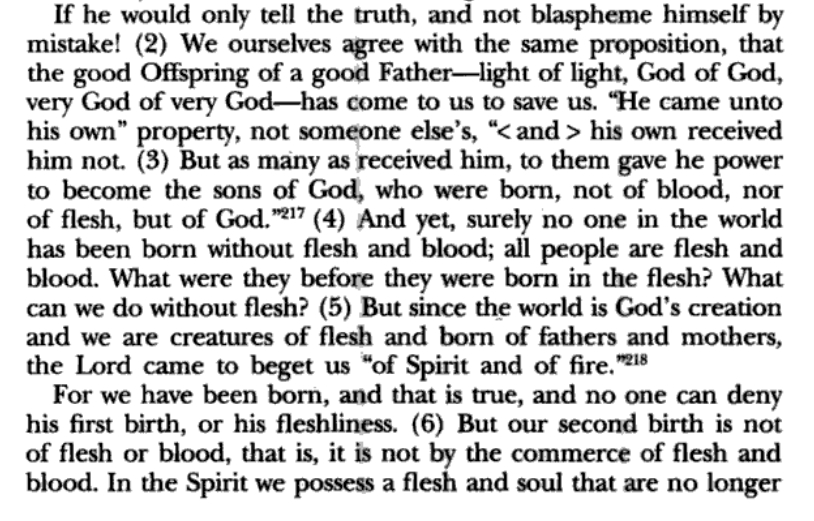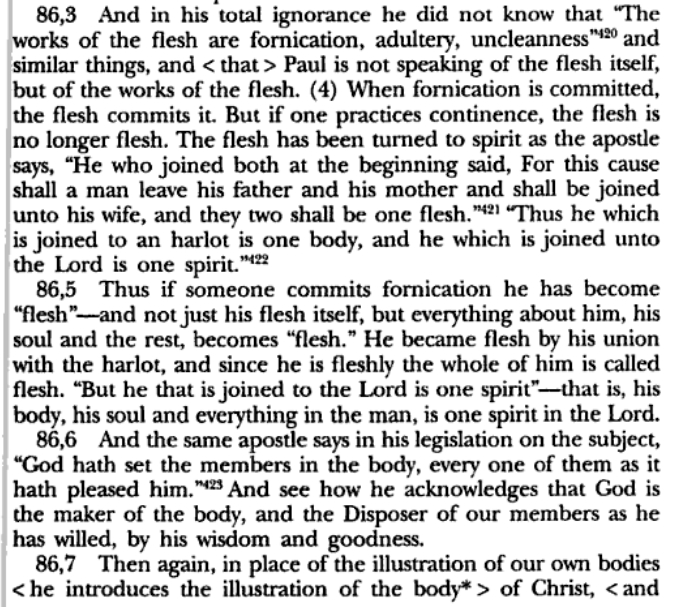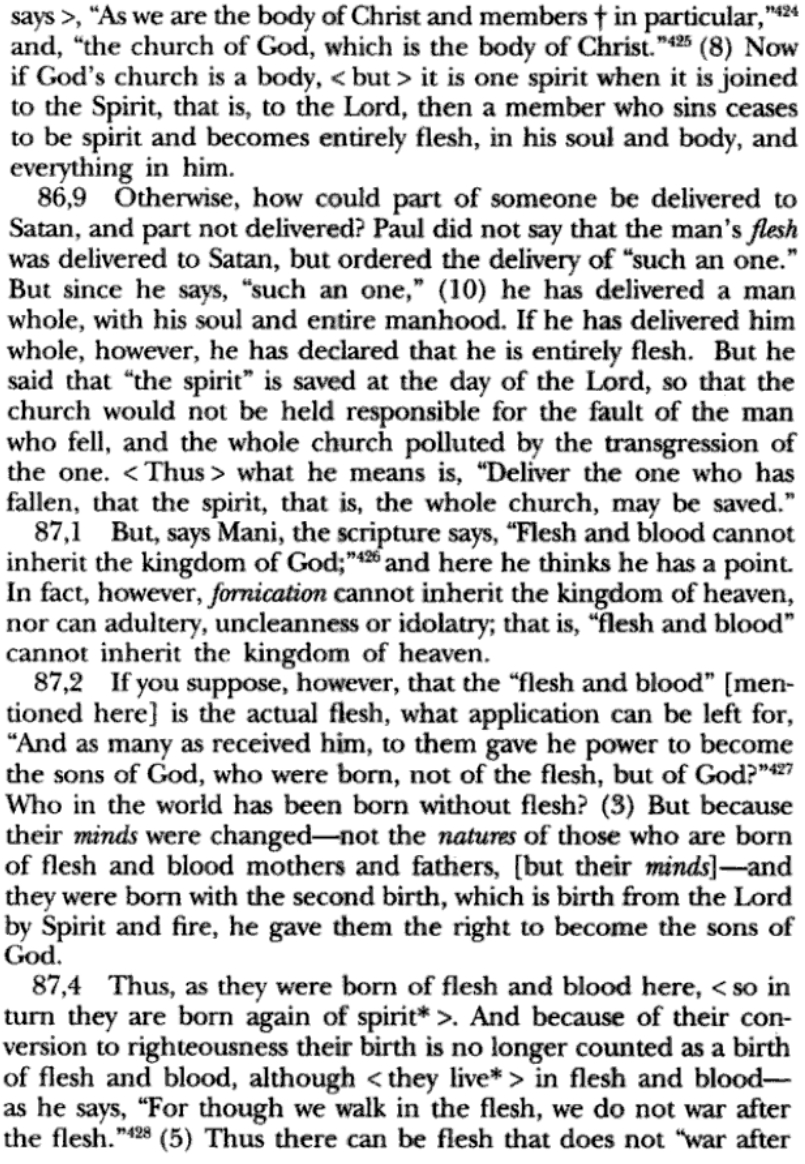
 |
Freethought & Rationalism ArchiveThe archives are read only. |
|
|
#1 |
|
Veteran Member
Join Date: Mar 2002
Location: Perth
Posts: 1,779
|
Gday all,
One of the issues that arose from Doherty is the idea of a sphere of "flesh" that is yet not physical - that "according to the flesh" does not necesarily mean physically on earth. So, here is an interesting tid-bit from Epiphanius I just found which discusses the beliefs of Mani to include : "In the spirit we possess a flesh and soul that is not carnal, but are blood flesh and soul in spiritual union." (From page 260 and 261 of Frank Williams translation of the Panarion Vol.II. Section 5, "Against Manicheans 46, but 66 in the series", Par. 42.)   Of course, Mani is quite a while later, but it's a clear description of spiritual "flesh". I'm reading through Google Books of (Volume 2 of the) Panarion - not sure how many pages I get to read, but I thought that nugget might be interesting. Kapyong |
|
|
|
|
#2 |
|
Veteran Member
Join Date: Jun 2010
Location: seattle, wa
Posts: 9,337
|
The Marcionites probably had a similar idea
|
|
|
|
|
#3 |
|
Veteran Member
Join Date: Mar 2002
Location: Perth
Posts: 1,779
|
Thanks for that :-)
But my Google Books has Marcionites greyed out :-( Kapyong |
|
|
|
|
#4 |
|
Contributor
Join Date: Mar 2006
Location: Falls Creek, Oz.
Posts: 11,192
|
G'Day K,
Both reading on google books and reading Epiphanius is a challenge. My hats off to you for wading into it. About the only thing I'd mention at this stage is that it helps to know the type of author you are reading. Epiphanius was a master heresiologist - he made a later 4th century study of heresy, and that's why we find mention of Mani. I will look forward to the time when an english translation becomes available for everyone. Its in the same class (4th century source material - English translations not ONLINE) as the "Codex Theodosianus". Best wishes, Pete |
|
|
|
|
#5 | ||
|
Veteran Member
Join Date: Mar 2002
Location: Perth
Posts: 1,779
|
Gday Pete :-)
Quote:
Quote:
Perhaps you, or some reader, would do me a favour and check what section "Marcionites" says about spiritual flesh etc.? Thanks :-) Kapyong |
||
|
|
|
|
#6 | |
|
Contributor
Join Date: Feb 2006
Location: the fringe of the caribbean
Posts: 18,988
|
Quote:
There is a problem. Manichaenism was regarded as HERETICAL and Manichaenism was started around the 3rd century. "Paul" was NOT described as a follower of Mani and the NT Canon, including the Pauline writings, do NOT SUPPORT the teachings of Mani. It is just NOT logical that the Church would CANONIZED a KNOWN heretical writing WITHOUT making any adjustments. |
|
|
|
|
|
#7 | ||
|
Contributor
Join Date: Mar 2006
Location: Falls Creek, Oz.
Posts: 11,192
|
Quote:
I have made some brief notes on Epiphanius. Quote:
The way I look at it is that the heresiologists divided up the Empire by means of their authoring a list of official heresies. With Hellenism, Stoicism, Platonism and Pythagoreanism - all in the first seven heresies - what chance did the Greeks have of expressing their opinion about the historical jesus and/or the mythical jesus. It's a pity we do not have the corresponding literature of these Greek heretics so we could see with our own eyes what they would have written about Jesus and the Apostles, whether myth or history. But perhaps we do have such evidence here, and are not valuing it for what it represents. Best wishes, Pete |
||
|
|
|
|
#8 |
|
Veteran Member
Join Date: Mar 2002
Location: Perth
Posts: 1,779
|
Here are some more interesting comments about "flesh" :
   K. |
|
|
|
|
#9 |
|
Contributor
Join Date: Mar 2006
Location: Falls Creek, Oz.
Posts: 11,192
|
I like the rhetorical question he slips in for some reason it reminds me of the docetic jesus (a subset of the JM) mentioned here and there in the Nag Hammadi codices and elsewhere in "Early Christian Sources".
"Who in the world was born without flesh"? |
|
|
|
|
#10 | |
|
Veteran Member
Join Date: Jan 2003
Location: Bli Bli
Posts: 3,135
|
Quote:
This spiritual "flesh" occurs only after an earthly life, in your reference. So for Jesus to undergo the (alleged) change mentioned he would have had to have been earthly flesh and blood |
|
|
|
| Thread Tools | Search this Thread |
|